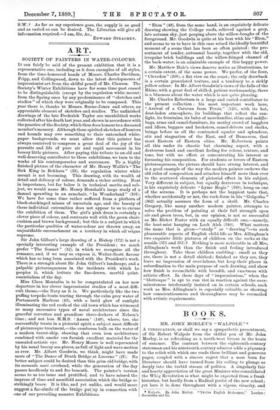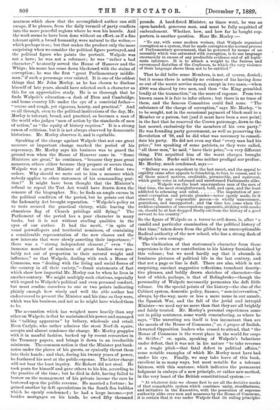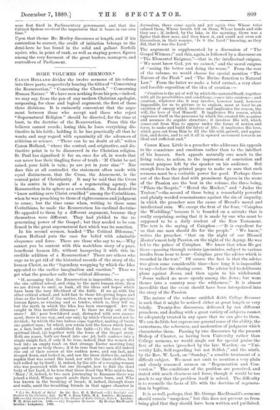BOOKS.
MR. JOHN MORLEY'S " WALPOLE."*
A VINDICATION, or shall we say a sympathetic presentment, of Sir Robert Walpole from the skilful pen of Mr. John Morley, is as refreshing as a north-west breeze in the heats of summer. The contrast between the eighteenth-century statesman and his nineteenth-century admirer adds a piquancy to the relish with which one reads these brilliant and generous pages, coupled with a sincere regret that a man born for literature should have turned from his calling to plange so deeply into the turbid stream of politics. A singularly fair and hearty appreciation of the great Minister who consolidated the Whig Revolution is what might be expected from a frank historian, but hardly from a Radical purist of the new school; yet here it is, done throughout with a vigour, vivacity, and • Walpole. By John Morley. "Twelve English Statesmen." London : Macmillan and Co.
neatness which show that the accomplished author can still escape, if he pleases, from the daily turmoil of party conflicts into the more peaceful regions where he won his laurels. And
the work seems to have been done without an effort, as if a fine tolerant spirit, a broad humanity, were natural to the writer,—
which perhaps is so ; but that makes the product only the more surprising when we consider the political figure portrayed, and the political figure who paints the portrait. Walpole was not a hero ; he was not a reformer; he was "rather a bad character ;" he stoutly served the House of Hanover and the Whigs ; his name has come down blackened with the stains of corruption ; he was the first " great Parliamentary middle- man," if such a personage ever existed. It is one of the oddest things that Mr. John Morley, as he has chosen to disclose himself of late years, should have selected such a character as this for an appreciative study. He is so thorough that he finds Walpole's education—a dash of Eton and Cambridge, and home country life under the eye of a convivial father- " coarse and rough, yet vigorous, hearty, and practical." And so all through, even to the political institutions of the day, Mr. Morley is tolerant, broad, and practical, as becomes a man of the world who judges "men of action by the standards of men of action," as " the equity of history requires." It is a strong canon of criticism, but it is not always observed by democratic historians. Mr. Morley observes it, and is equitable.
Speaking of the charge against Walpole that not one great measure or important change marked the period of his supremacy, Mr. Morley says his business was to guard the ground won when the House of Hanover came in. " Some Ministers are great," he continues, " because they pass great measures, others either because they prepare or secure them. Walpole was a great Minister of the second of these two orders. Why should we mete out to him a measure which nobody applies to other statesmen of his commanding posi- tion P" It might have been thought that the Minister's refusal to repeal the Test Act would have drawn down the censure of the biographer. No; he finds an ample excuse in the political condition of the period, but he points out that the Indemnity Act brought reparation. " Walpole's policy as to tests secured the practical victory, while leaving the obnoxious flag of Church privilege still flying." The Parliament of the period has a poor character in many books, but it is not without sterling qualities in the eyes of our author. It had the merit, " in spite of venal potwallopers and territorial nominees, of containing a considerable representation of the new classes and the new interests that were slowly asserting their importance;" there was a " strong independent element ;" even " the immense number of nominees of great families were pro- bably not out of proportion to their natural weight and influence," so that Walpole, dealing with such a House of Commons, was " dealing with the living and social forces of the country in all their variety,"—frank statements of fact which show how impartial Mr. Morley can be when he lives in another century. We might multiply such citations, especially with regard to Walpole's political and even personal conduct, but must confine ourselves to one or two points indicating plainly enough how wisely and well the able author has endeavoured to present the Minister and his time as they were, which was his business, and not as he might have wished them to be.
The accusation which has weighed more heavily than any other on Walpole, is that he maintained his power and managed his " talking apparatus" by bribery, wholesale and retail. Even Carlyle, who rather admires the stout Norfolk squire, accepts and almost condones the charge. Mr. Morley grapples with it in manful fashion, backed up by recent researches in the Treasury papers, and brings it down to an irreducible minimum. The common notion is that the Minister put bank- notes under the plates of his guests, or cynically thrust them into their hands ; and that, during his twenty years of power, he feathered his nest at the public expense. The latter charge will not bear the least inquiry. Sir Robert did not steal. He took posts for himself and gave others to his kin, according to the practice of the time; but he died in debt, having failed to bestow on the management of his private income the care he bestowed upon the public revenue. He married a fortune ; he gained another by deft speculations in the South Sea bubbles which he openly condemned ; he had a large income,—yet besides mortgages on his lands, he owed fifty thousand pounds. A hard-fisted Minister, as times went, he was an open-handed, generous man, and must be tally acquitted of embezzlement. Whether, how, and how far he bought sup- porters, is another question. Hear Mr. Morley :—
"To say, with some modern writers, that Walpole organised corruption as a system, that he made corruption the normal process of Parliamentary government, that he governed by means of any assembly which was saturated with corruption, is to use language enormously in excess of any producible evidence and of all legiti- mate inference. It is to attach a weight to the furious and' envenomed diatribes of the Craftsman, to which the very violence of their language shows them not to be entitled."
That he did bribe some Members, is not, of course, denied ;- but it seems there is actually no evidence of his having done so out of the secret service money, except in two cases,—when £900 was shared by two men, and then " the King grumbled loudly at the transaction," on the score of expense. From two- known cases it is fair to infer others ; but there is no trace of them, and the famous Committee could find none. " The substance of the charge of corruption," says Mr. Morley, " to be sought, not in the occasional payment of black-mail to a Member or a patron, but [and it must have been a sore point) in the fact that he reserved the Crown patronage, down to the
last morsel, exclusively for the members of his own party." He was founding party government, as well as preserving the-
Revolution of '88, and he did what was necessary to consoli- date his party. He did not even say that " every man had his price ;" but speaking of some patriots, as they were called, " all these men," he said, " have their price,"—a very different thing. Pitt acquitted him of the worst charges brought against him. Burke said he was neither prodigal nor profuse..
Mr. Morley, much condensed, says :-
" Bribery was an expedient in the last resort, and the appeal to cupidity came after appeals to friendship, to fear, to reason, and to all those mixed motives, creditable, permissible, and equivocal,. which guide votes in reformed and unreformed Parliaments alike.
Walpole was the least unscrupulous man of the men of that time, the most straightforward, bold, and open, and the least
addicted to scheming and cabal The imputation of per- sonal corruption and private plunder—never openly made, be it observed, by any responsible person—is wholly unnecessary,. gratuitous, and unsupported ; and the time has come when the reckless calumnies of unscrupulous opponents, striking with masks on, should be at last dropped finally out from the history of a good servant to his country."
So the figure of Walpole as a terror to evil-doers, is, after " a candid and particular examination of the political history of that time," taken down from the gibbet by an unexceptionable Radical authority of the new school, who has a strong dash of Walpole's own courage.
The vindication of that statesman's character from these- aspersions is the new contribution to his history furnished by this volume ; but we need hardly say that it abounds in luminous pictures of political life in the last century, and that not a page or line is dull. There are also, which is not surprising, succinct suggestive reflections, trenchant descrip- tive phrases, and boldly drawn sketches of character—the- best of which, perhaps, is that of Bolingbroke—though the-
personality of Walpole necessarily permeates the deft little volume. On the special points of the history—the rise of the Cabinet system, domestic policy, finance, " non-intervention,"
always, by-the-way, more or less a mere name in our annals,.
the Spanish War, and the fall of the jovial and intrepid Minister—we need say no more than that they are all brightly and fairly treated. Mr. Morley's personal experiences come- out in pithy sentences, some worth remembering, as where he
says, " The unresting sea itself is less inconstant than are the moods of the House of Commons ;" or, a propos of foolish,
thwarted Opposition leaders who ceased to attend, that " the House of Commons is the worst place in the world for coups de theatre;" or, again, speaking of Walpole's behaviour under defeat, that it was not in his nature " to take reverses at a tragic pitch—that fatal defect in political affairs,"
some notable examples of which Mr. Morley must have had under his eye. Finally, we may take leave of this book, excellent in so many ways, but most notable for a tolerant
fairness, with this sentence, which indicates the permanent lodgment in embryo of a new principle, or rather new method, in the very heart of the British constitutional system :-
" At whatever date we choose first to see all the decisive marks of that remarkable system which combines unity, steadfastness, and initiative in the Executive, with the possession of supreme- authority alike over men and measures by the House of Commons,. it is certain that it was under Walpole that its ruling principles were first fixed in Parliamentary government, and that the Cabinet System received the impression that it bears in our own time."
Upon that theme Mr. Morley discourses at length, and if his contention be correct, the credit of initiation belongs to the demi-hero he has found in the solid and gallant Norfolk squire, who, in point of rank, as well as staying power, figures among the very foremost of the great leaders, managers, and controllers of Parliament.
























































 Previous page
Previous page